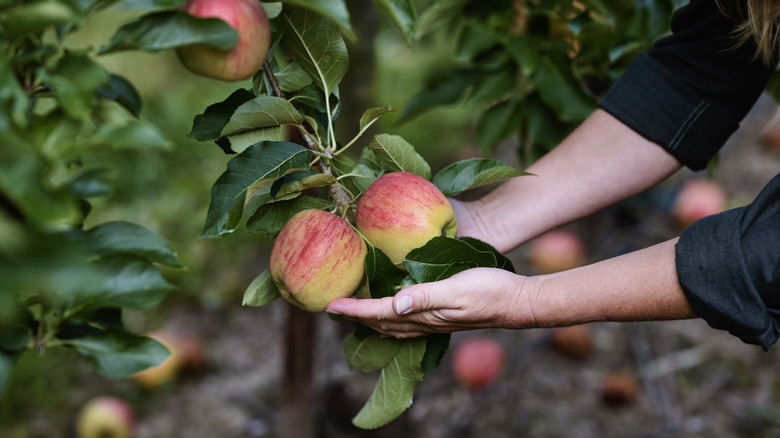Here's How Long It Might Take For Your Apple Tree To Grow Juicy Fruits
So you've purchased an apple tree from the plant nursery, and you're wondering if you can expect apple pie this year. Or maybe you planted a tree a couple of years ago and have yet to see the fruits of your labor. Take heart. Most likely, apples are on the way. The apple trees you can purchase at the landscaping center are typically one to two years old and too young to produce fruit. Dwarf trees can produce fruit as soon as two to three years, while larger varieties need as many as eight years to reach maturity. Keep in mind, though, that moving your tree from the nursery pot to the ground is a stressful experience for any plant. Trees need time to adjust to the new surroundings, and it's unlikely they'll bear fruit in their first year.
That's not all, though. If you aren't well-informed on how to care for your apple tree, you can forget the fruit. In order to produce apples, these trees need to be cross-pollinated by other species of apples. Even a crabapple tree can do the job. So, if you (or your neighbor) don't have a second apple tree, you may want to plant one to harvest a bounty.
What to know when selecting an apple tree cultivar
Each apple tree variety matures and bears fruit at a different rate. So, if you want apples fast, choose dwarf and semi-dwarf varieties of cultivars like Honeycrisp, Gala, and Granny Smith. These take as little as three years to fruit. Red Delicious fruits as soon as four years old.
Similarly, each variety fruits at a different time of year. Although apples are typically harvested in the fall, some varieties are ready for harvest sooner. Early-harvest trees produce in late July or early to mid-August and include Golden Early, Jersey Mac, Paula Red, Lodi, and Ginger Gold. Other cultivars are ready for harvest in September. Some examples are Gala, Jonathan, McIntosh, Honeycrisp, and Red Delicious. October-bearing trees include Jonagold, Macoun, Mutsu, Golden Delicious, Cameo, Braeburn, Granny Smith, Fuji, and Pink Lady. If you'd like to harvest apples all season, then plant a mix of trees. Don't just stick to the apples you see in the grocery store either. Heirloom apple trees have much to offer.
Another factor to consider is chill hours. Apple trees require a certain number of hours per year when temperatures drop below 45 degrees Fahrenheit. However, this amount varies by cultivar. A medium chill apple requires 500 to 700 hours. Fuji, Gala, Granny Smith, and Pink Lady apples require 500 or fewer hours of chill time. High-chill apple varieties include Red Delicious and Honeycrisp. Let chill times guide you to choosing a cultivar for your zone to ensure your tree fruits successfully.
How to protect apples before harvest
Once you notice apples appearing on your tree, it's time to monitor their progress and protect them from pests. Some of the most common apple tree pests include codling moths, spider mites, and aphids. If your region has been affected by the invasive lanternfly, you can also expect to see those, as they love fruit trees and are commonly found in orchards. Battling pests is largely about prevention. Some simple steps you can take are to remove fallen apples to reduce apple maggot population. You can lower the risk of codling moth infestations by thinning fruit on the tree; these pests often enter apples where two fruits touch. Learn how to identify lanternfly egg masses and knock them down. Or, use a DIY solution to eliminate a lanternfly infestation.
Another helpful trick for preventing pest damage: bag your apples while they're still growing. You can even use a plastic sandwich bag to do the job. The reason this works is that the plastic bag creates a barrier against pests that burrow into fruit, like the codling moth, apple maggot, and others. However, bags can also guard against fungal diseases like apple scab, which spread on the wind. Covering the apple prevents those fungus spores from spreading on the fruit. The bags can be left on the apples until you're ready to harvest. The result should be delicious fruit that's free from damage.


